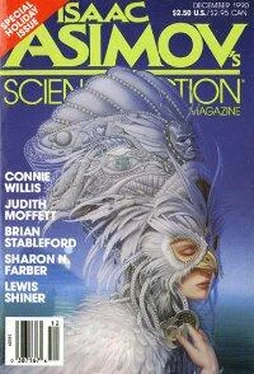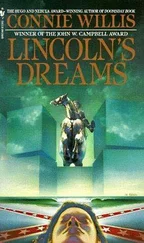Connie Willis - Cibola
Здесь есть возможность читать онлайн «Connie Willis - Cibola» весь текст электронной книги совершенно бесплатно (целиком полную версию без сокращений). В некоторых случаях можно слушать аудио, скачать через торрент в формате fb2 и присутствует краткое содержание. Год выпуска: 1990, Издательство: Davis Publications, Inc., Жанр: Фантастика и фэнтези, на английском языке. Описание произведения, (предисловие) а так же отзывы посетителей доступны на портале библиотеки ЛибКат.
- Название:Cibola
- Автор:
- Издательство:Davis Publications, Inc.
- Жанр:
- Год:1990
- ISBN:нет данных
- Рейтинг книги:5 / 5. Голосов: 1
-
Избранное:Добавить в избранное
- Отзывы:
-
Ваша оценка:
- 100
- 1
- 2
- 3
- 4
- 5
Cibola: краткое содержание, описание и аннотация
Предлагаем к чтению аннотацию, описание, краткое содержание или предисловие (зависит от того, что написал сам автор книги «Cibola»). Если вы не нашли необходимую информацию о книге — напишите в комментариях, мы постараемся отыскать её.
Cibola — читать онлайн бесплатно полную книгу (весь текст) целиком
Ниже представлен текст книги, разбитый по страницам. Система сохранения места последней прочитанной страницы, позволяет с удобством читать онлайн бесплатно книгу «Cibola», без необходимости каждый раз заново искать на чём Вы остановились. Поставьте закладку, и сможете в любой момент перейти на страницу, на которой закончили чтение.
Интервал:
Закладка:
“That’s why you’re a reporter, because you like to write?”
“No,” I said. “The writing’s a real pain. When will this time-warp thing happen again?”
She bit into a donut. “That’s Cinderella City,” she said, gesturing to the mall on our right with it. “You ever been there?”
I nodded.
“I went there once. They got marble floors and this big fountain. They got lots of stores. You can buy just about anything you want there. Clothes, jewels, shoes.”
If she wanted to do a little shopping now that she’d had breakfast, she could forget it. And she could forget about changing the subject. “When can we go see the Seven Cities again? Tomorrow?”
She licked cream filling off her fingers and turned the News over. “Not tomorrow,” she said. “El Turco would have liked Cinderella City. He didn’t have no shoes. He had to walk all the way to Colorado in his bare feet. Even in the snow.”
I imagined my hands closing around her plump neck. “When are the Seven Cities going to be there again?” I demanded. “And don’t tell me they’re always there.”
She consulted the celebrity squibs. “Not tomorrow,” she said. “Day after tomorrow. Five o’clock. You must like people, then. That’s why you wanted to be a reporter? To meet all kinds of people?”
“No,” I said. “Believe it or not, I wanted to travel.”
She grinned her golden smile at me. “Like Coronado,” she said.
I spent the next two days interviewing developers, environmentalists, and council members, and pondering why Coronado had continued to follow El Turco, even after it was clear he was a pathological liar.
I had stopped at the first 7-Eleven I could find after letting Rosa and her donuts off and bought a copy of the News . I read the entire back section, including the comics. For all I knew, she was using Doonesbury for an oracle. Or Nancy .
I read the obits and worked the crossword puzzle and then went over the back page again. There was nothing remotely time-warp-related. The moon was at first quarter. Sunset would occur at 7:51 P.M. Road conditions for the Eisenhower Tunnel were snow-packed and blowing. Chains required. My horoscope read, “Don’t get involved in wild goose chases. A good stay-at-home day.”
Rosa no more knew where the Seven Cities of Gold were than her great-great-grandfather. According to the stuff I read in between moratorium jaunts, he had changed his story every fifteen minutes or so, depending on what Coronado wanted to hear.
The other Indian scouts had warned Coronado, told him there was nothing to the north but buffalo and a few teepees, but Coronado had gone blindly on. “El Turco seems to have exerted a Pied-Piperlike power over Coronado,” one of the historians had written, “a power which none of Coronado’s officers could understand.”
“Are you still working on that crazy Coronado thing?” Jake asked me when I got back to the Record . “I thought you were covering the hearings.”
“I am,” I said, looking up the Grand Canyon. “They’ve been postponed because of the snow. I have an appointment with the United Coalition Against Uncontrolled Growth at eleven.”
“Good,” he said. “I don’t need the Coronado piece, after all. We’re running a series on ‘Denver Today’ instead.”
He went back upstairs. I found the Grand Canyon. It had been discovered by Lopez de Cardeñas, one of Coronado’s men. El Turco hadn’t been with him.
I drove out to Aurora in a blinding snowstorm to interview the United Coalition. They were united only in spirit, not in location. The president had his office in one of the Pavilion Towers off Havana, ut the secretary who had all the graphs and spreadsheets, was out at Fiddler’s Green. I spent the whole afternoon shuttling back and forth between them through the snow, and wondering what had ever possessed me to become a journalist. I’d wanted to travel. I had had the idea, gotten from TV that journalists got to go all over the world, writing about exotic and amazing places. Like the UNIPAC building and the Plaza Towers.
They were sort of amazing, if you like Modern Corporate. Brass and chrome and Persian carpets. Atriums and palm trees and fountains splashing in marble pools. I wondered what Rosa, who had been so impressed with Cinderella City, would have thought of some of these places. El Turco would certainly have been impressed. Of course, he would probably have been impressed by the donut shop, and would no doubt have convinced Coronado to drag his whole army there with tales of fabulous, cream-filled wealth.
I finished up the United Coalition and went back to the Record to call some developers and builders and get their side. It was still snowing, and there weren’t any signs of snow removal, creative or otherwise, that I could see. I set up some appointments for the next day, and then went back down to Research.
El Turco hadn’t been the only person to tell tales of the fabulous Seven Cities of Gold. A Spanish explorer, Cabeza de Vaca, had reported them first, and his black slave Estevanico claimed to have seen them, too. Friar Marcos had gone with Estevanico to find them, and, according to him, Estavanico had actually entered Cibola.
They had made up a signal. Estevanico was to send back a small cross if he found a little village, a big cross if he found a city. Estevanico was killed in a battle with Indians, and Friar Marcos fled back to Coronado, but he said he’d seen the Seven Cities in the distance, and he claimed that Estevanico had sent back “a cross the size of a man.”
There were all kinds of other tales, too, that the Navajos had gold and silver mines, that Montezuma had moved his treasure north to keep it from the Spanish, that there was a golden city on a lake, with canoes whose oarlocks were solid gold. If El Turco had been lying, he wasn’t the only one.
I spent the next day interviewing pro-uncontrolled growth types. They were united, too. “Denver has to retain its central identity,” they all told me from what it was hard to believe was not a pre-written script. “It’s becoming split into a half-dozen sub-cities, each with its own separate goals.”
They were in less agreement as to where the problem lay. One of the builders who’d developed the Tech Center thought the Plaza Tower out at Fiddler’s Green was an eyesore, Fiddler’s Green complained about Aurora, Aurora thought there was too much building going on around Colorado Boulevard. They were all united on one thing, however: downtown was completely out of control.
I logged several thousand miles in the snow, which showed no signs of letting up, and went home to bed. I debated setting my alarm. Rosa didn’t know where the Seven Cities of Gold were, the Living Western Heritage series had been canceled, and Coronado would have saved everybody a lot of trouble if he had listened to his generals.
But Estevanico had sent back a giant cross, and there was the “time-thing” thing. I had not done enough stories on psychic peridontia yet to start believing their nutto theories, but I had done enough to know what they were supposed to sound like. Rosa’s was all wrong.
“I don’t know what it’s called,” she’d said, which was far too vague. Nutto theories may not make any sense, but they’re all worked out, down to the last bit of pseudo-scientific jargon. The psychic dentist had told me all about transcendental maxillofacial extractile vibrations, and the time travel guy had showed me a hand-lettered chart showing how the partial load setting affected future events.
If Rosa’s Seven Cities were just one more nutto theory, she would have been talking about morphogenetic temporal dislocation and simultaneous reality modes. She would at least know what the “time-thing” was called.
Читать дальшеИнтервал:
Закладка:
Похожие книги на «Cibola»
Представляем Вашему вниманию похожие книги на «Cibola» списком для выбора. Мы отобрали схожую по названию и смыслу литературу в надежде предоставить читателям больше вариантов отыскать новые, интересные, ещё непрочитанные произведения.
Обсуждение, отзывы о книге «Cibola» и просто собственные мнения читателей. Оставьте ваши комментарии, напишите, что Вы думаете о произведении, его смысле или главных героях. Укажите что конкретно понравилось, а что нет, и почему Вы так считаете.












